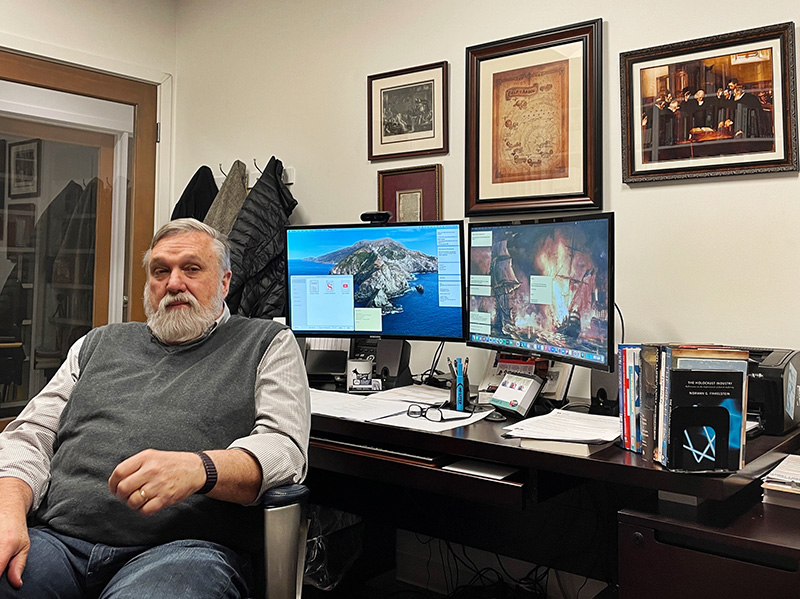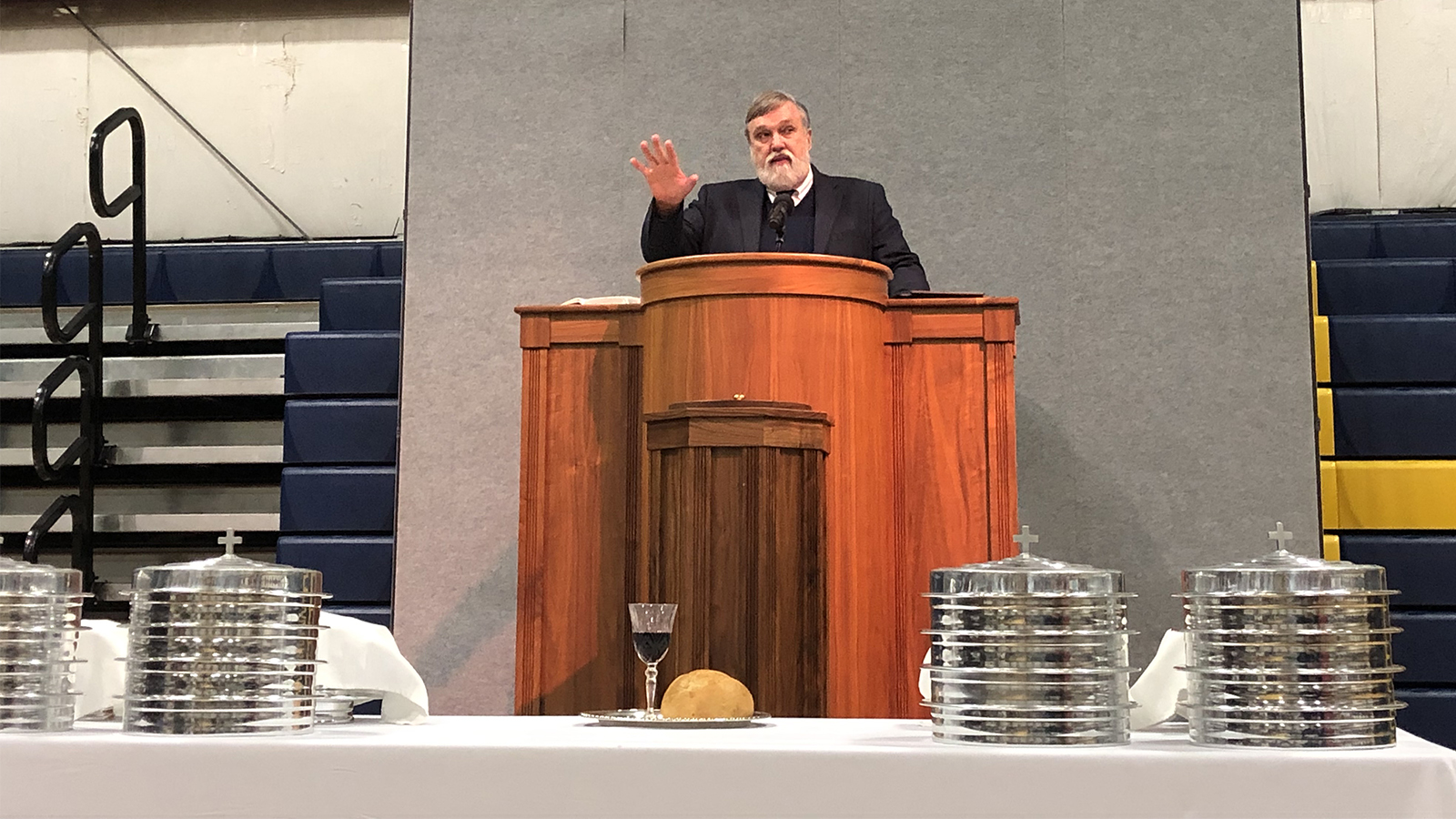Calvinist Activist Warns that White Nationalism Is Invading Reformed Churches
The anti-woke alliance of Calvinist Theobros and Christian nationalists hits the skids — as author Owen Strachan feuds online with Andrew Torba of Gab.
Contributions from FāVS from readers like you make this news story possible. Thank you.
News Story by Bob Smietana | Religion News Service
Owen Strachan, a Southern Baptist seminary professor turned anti-woke activist, has spent years warning that liberals were undermining America’s evangelical Christian churches.
Now Strachan is taking aim at a new threat: “mono-ethnic Christian nationalism.”
In a series of recent posts on social media and in his newsletter on Substack, Strachan makes clear that the ethnicity in question is European American. He warns that Christian nationalism — or, as Strachan described it, “the unbiblical view that we must preserve white ethnicity to build a Christian nation” — has taken root in the Reformed wing of the evangelical church.
Strachan has singled out for disfavor Christian nationalist activists such as Andrew Torba, founder of the far-right social media platform Gab, and conservative internet influencer Matt Walsh, who describes himself in his X (formerly Twitter) profile as a “Theocratic fascist” and bestselling children’s author.
“By the minute, we are smoking out white nationalism — godless ethnocentrism — in Christian circles,” Strachan wrote in a series of posts on X. “By grace, we will fight this wicked ideology.”
Strachan, who is provost of Grace Bible Theological Seminary, a small school in Arkansas, and author of a popular book called “Christianity and Wokeness,” said he has been concerned for some time that racist and antisemitic ideas have been finding their way into conservative churches.
He felt the need to call out the trend earlier this month after a video appeared of Walsh saying that white Americans needed to have more children to save the country from outsiders. Strachan had already seen comments from Torba on social media, since deleted, saying that God created different ethnic groups with a purpose and that preserving them “is to preserve God’s creation and is therefore an inherent good.”

Strachan called Torba’s comments “hot nonsense” that was nonetheless invading churches. (Torba declined to be interviewed for the story or to respond to Strachan’s comments.)
Once a rising star among Southern Baptists, Strachan (pronounced “STRAY-han”) is a former president of the Council on Biblical Manhood & Womanhood, an influential group that promotes complementarian theology — based on the idea that men and women have biblically circumscribed roles in the family and society. He also taught at Southern Baptist Theological Seminary and Midwestern Baptist Theological Seminary before moving to Arkansas.
But in recent years, he has become best known for his stature within a corner of the evangelical world known for its love of stark Calvinist theology and dark-suited, bespectacled and bearded pastors, often tagged by evangelical insiders as “Theobros.”
Calvinism, the teachings of 16th-century French Protestant theologian John Calvin, undergirds some mainline Protestant denominational beliefs but is represented most prominently in various evangelical groups that bear the name “Reformed.” As political and cultural polarization has deepened over the past decade in the U.S., it has attracted the Theobros and other ultraconservative Christians because Calvin’s theology also inspired early American religious colonists such as the Puritans.

Christian nationalism has become a hot topic among these Christians. In its extreme form, the ideology claims special privileges for Christians — including the right to rule, no matter what the outcome of elections — and often views Jews, Black Americans, immigrants and progressives as God’s enemies. Early forms of Christian nationalism were outspokenly antisemitic and racist and were especially opposed to interracial marriage.
A bestselling book, “The Case for Christian Nationalism,” published in 2022 by Canon Press — which was founded as a ministry of Christ Church, an influential Calvinist congregation in Moscow, Idaho — argued that “interethnic” marriage can be sinful and that America should be run by Christians. The author, Stephen Wolfe, has since clarified that he does not think “interracial marriage, interethnic marriage, or intercultural marriage” is sinful.
Canon is now a private company whose authors include Douglas Wilson, pastor of Christ Church. Wilson also owns a minority share of Canon. In 2022, he blurbed a book on Christian nationalism by Torba, who is known for expressing antisemitic and white nationalist views.
Strachan said that Wilson had a responsibility to call out racist ideas in Reformed churches. “I’m very interested — with a lot of people — to see how Moscow operates in days ahead,” Strachan said. “Because I think they bear a real duty.”
In a phone interview, Wilson said he agreed with Strachan that he has a responsibility to speak about racism or antisemitic ideas. He also said that he has seen glimpses of racism in Calvinist circles. “I see guys flirting with something I don’t want them flirting with,” he said.

He rejected the ideas proposed by Walsh that white Christians needed to have more white babies to save the country or any notion that interracial marriage is sinful.
“You can have an ethnic affection for your people,” he said. “The problem would come when you mandate or say we are going to discipline you or come down on you hard if you marry outside the tribe.”
Wilson also pointed to a pair of 2022 statements issued by the Knox Presbytery of the Communion of Reformed Evangelical Churches, of which Christ Church is a part. Those statements condemn both antisemitism and kinism, which claims that God wants different ethnic groups to be segregated.
“While an ethnic heritage is something to be grateful for, and which may be preserved in any way consistent with the law of God, it is important to reject every form of identity politics, including kinism—whether malicious, vainglorious, or ideologically separatist/segregationist,” read one of the statements, which are published on Wilson’s blog.
But Wilson said Wolfe’s book had been misunderstood, arguing that political progressives are looking for ways to make conservative Christians look bad. “I think the strategy is, very simply, for the progressive left to kick the dog until the dog bites,” he said.

He also said that agrees with Strachan that churches need to address overt racism. “I would say, ‘We’re way ahead of you,’” Wilson said. “I condemned this nonsense decades ago.”
For his part, Strachan hopes his comments will lead to an anti-kinist movement among evangelicals, similar to the anti-woke movement he is a part of. That movement was attracted by Calvinists and Christian nationalists — but that partnership may now be on shaky grounds.
Still, Strachan said he’s gotten some pushback for his remarks from fellow Calvinists who see him as betraying their team by being critical. He plans to address the issue of kinism during a meeting in September organized by G3, a Calvinist organization with Baptist ties.

George Yancey, a professor of sociology at Baylor University, said Strachan is like a lot of Americans who want to believe that race does not matter anymore, but who draw the line at overt racism. That belief, however, rejects any notion of institutional racism or the view that past racism still affects American culture.
“I think colorblind is the right word,” he said. “He’s a true believer.”
Yancey said he too has been seeing signs of outright racism in Christian nationalist circles, taking the form of kinism.
He suspects that Americans who hold a colorblind view like Strachan’s exceed the number who hold intentionally racist forms of Christian nationalism. While Christians of all stripes have spoken against Christian nationalism, Strachan’s willingness to criticize allies in his war on wokeness is striking.
Strachan’s analysis is right in this case, Yancey said.
“And if he’s right about something, I’m going to say he’s right,” he said. “This kind of kinism is racism — and racist in the traditional sense of being racism. If he is going to go after them, I am going to say, ‘Go after them.’”
(This story has been updated to clarify Stephen Wolfe’s comments on marriage. The story was reported with support from the Stiefel Freethought Foundation.)






